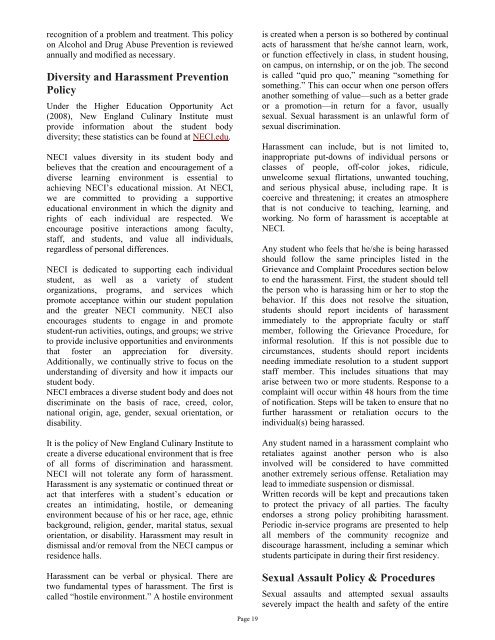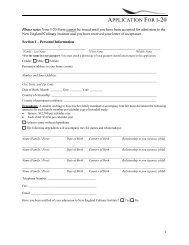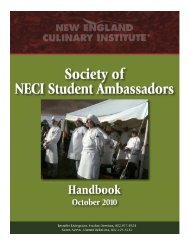Student Handbook - New England Culinary Institute
Student Handbook - New England Culinary Institute
Student Handbook - New England Culinary Institute
You also want an ePaper? Increase the reach of your titles
YUMPU automatically turns print PDFs into web optimized ePapers that Google loves.
ecognition of a problem and treatment. This policy<br />
on Alcohol and Drug Abuse Prevention is reviewed<br />
annually and modified as necessary.<br />
Diversity and Harassment Prevention<br />
Policy<br />
Under the Higher Education Opportunity Act<br />
(2008), <strong>New</strong> <strong>England</strong> <strong>Culinary</strong> <strong>Institute</strong> must<br />
provide information about the student body<br />
diversity; these statistics can be found at NECI.edu.<br />
NECI values diversity in its student body and<br />
believes that the creation and encouragement of a<br />
diverse learning environment is essential to<br />
achieving NECI’s educational mission. At NECI,<br />
we are committed to providing a supportive<br />
educational environment in which the dignity and<br />
rights of each individual are respected. We<br />
encourage positive interactions among faculty,<br />
staff, and students, and value all individuals,<br />
regardless of personal differences.<br />
NECI is dedicated to supporting each individual<br />
student, as well as a variety of student<br />
organizations, programs, and services which<br />
promote acceptance within our student population<br />
and the greater NECI community. NECI also<br />
encourages students to engage in and promote<br />
student-run activities, outings, and groups; we strive<br />
to provide inclusive opportunities and environments<br />
that foster an appreciation for diversity.<br />
Additionally, we continually strive to focus on the<br />
understanding of diversity and how it impacts our<br />
student body.<br />
NECI embraces a diverse student body and does not<br />
discriminate on the basis of race, creed, color,<br />
national origin, age, gender, sexual orientation, or<br />
disability.<br />
It is the policy of <strong>New</strong> <strong>England</strong> <strong>Culinary</strong> <strong>Institute</strong> to<br />
create a diverse educational environment that is free<br />
of all forms of discrimination and harassment.<br />
NECI will not tolerate any form of harassment.<br />
Harassment is any systematic or continued threat or<br />
act that interferes with a student’s education or<br />
creates an intimidating, hostile, or demeaning<br />
environment because of his or her race, age, ethnic<br />
background, religion, gender, marital status, sexual<br />
orientation, or disability. Harassment may result in<br />
dismissal and/or removal from the NECI campus or<br />
residence halls.<br />
Harassment can be verbal or physical. There are<br />
two fundamental types of harassment. The first is<br />
called “hostile environment.” A hostile environment<br />
is created when a person is so bothered by continual<br />
acts of harassment that he/she cannot learn, work,<br />
or function effectively in class, in student housing,<br />
on campus, on internship, or on the job. The second<br />
is called “quid pro quo,” meaning “something for<br />
something.” This can occur when one person offers<br />
another something of value—such as a better grade<br />
or a promotion—in return for a favor, usually<br />
sexual. Sexual harassment is an unlawful form of<br />
sexual discrimination.<br />
Harassment can include, but is not limited to,<br />
inappropriate put-downs of individual persons or<br />
classes of people, off-color jokes, ridicule,<br />
unwelcome sexual flirtations, unwanted touching,<br />
and serious physical abuse, including rape. It is<br />
coercive and threatening; it creates an atmosphere<br />
that is not conducive to teaching, learning, and<br />
working. No form of harassment is acceptable at<br />
NECI.<br />
Any student who feels that he/she is being harassed<br />
should follow the same principles listed in the<br />
Grievance and Complaint Procedures section below<br />
to end the harassment. First, the student should tell<br />
the person who is harassing him or her to stop the<br />
behavior. If this does not resolve the situation,<br />
students should report incidents of harassment<br />
immediately to the appropriate faculty or staff<br />
member, following the Grievance Procedure, for<br />
informal resolution. If this is not possible due to<br />
circumstances, students should report incidents<br />
needing immediate resolution to a student support<br />
staff member. This includes situations that may<br />
arise between two or more students. Response to a<br />
complaint will occur within 48 hours from the time<br />
of notification. Steps will be taken to ensure that no<br />
further harassment or retaliation occurs to the<br />
individual(s) being harassed.<br />
Any student named in a harassment complaint who<br />
retaliates against another person who is also<br />
involved will be considered to have committed<br />
another extremely serious offense. Retaliation may<br />
lead to immediate suspension or dismissal.<br />
Written records will be kept and precautions taken<br />
to protect the privacy of all parties. The faculty<br />
endorses a strong policy prohibiting harassment.<br />
Periodic in-service programs are presented to help<br />
all members of the community recognize and<br />
discourage harassment, including a seminar which<br />
students participate in during their first residency.<br />
Sexual Assault Policy & Procedures<br />
Sexual assaults and attempted sexual assaults<br />
severely impact the health and safety of the entire<br />
Page 19






